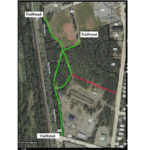Home »

Building better communities
For the most part we all live in a community. There may be a few who can’t see the neighbours house because it is miles away but the majority of modern society has found it beneficial to live in communities with amenities such as schools and hospitals and grocery stores close by.
The phenomenon of the city is that we may live in a neighbourhood but there is a good chance we won’t know our neighbours other than to see them drive by. As our society, has become more connected via the Internet we have become more withdrawn from our surroundings; a sad consequence of the electronic age. We spend less time talking to our neighbours and more time texting on our phones or checking social media.
That may appear to be the problem, but it is more likely the symptom. There are other factors that have become the norm in families that are having a huge impact on how we interact with others.
A study several years ago, indicated that the average family in Canada has added as much as 2.5 hours to their work week. That is 2.5 hours a week no longer spent with family or friends but at work. No wonder families are stressed trying to balance their work life with their family life. As the electronic age continues to replace people with technology this can only become more acute. What is needed is radical change in our approach to work.
Families are becoming more fragmented as well, partly by stress but also by an aging population that is living longer.
Last Christmas we were asked to be ‘secret Santas’ to a senior resident at the FW Green home. They told us they had over 35 residents who have no family to speak of that will be sharing Christmas with them. For whatever reason that is a fairly significant number. Helping out was not a problem; the bigger question is, why is this happening? What can be done to keep families together?
If technology is going to replace people we must first figure out how to tax technology. With fewer people working means less income tax and as our government services depend on taxes we need an alternative to generate that income. One idea is to eliminate income tax and tax consumption. It makes sense, a consumption tax means that those who consume more pay more tax. Eliminating income tax takes the burden off the work force and relieves the stress.
The other idea is to use some of the revenue from consumption tax to create a guaranteed income for everyone. With a guaranteed income, some may decide that is all they need others may decide to expand on their education or become entrepreneurs and use the income as a spring board to greater achievement, the key is that technology which put people out of work is now providing those same people with income. A guaranteed income also eliminates the need for social welfare, and government pensions.
Technology should be leading to a shorter work-week not a longer work-week; 30 to 35 hours a week should be enough. More free time means more time to spend for family or community. It will lead to more happiness and contentment, which means less absenteeism and more productivity.
I’m not a fan of Halloween; however, we live in a neighbourhood that has several families who go to great lengths to decorate their homes and attract hundreds of families to see the haunted houses. Each year our street is filled with families with little ones in every costume imaginable wandering up and down the block to the point that there is a true festive atmosphere.
Many people are having conversations with each other, total strangers who live in the same neighbourhood who have been brought together by a common objective. It is really quite an enjoyable site and points out that our desire to socialize with each other is alive and strong it just needs an excuse. It doesn’t have to be an organized event it can be as simple as Halloween.
Perhaps we need to have an annual block party day. Set aside a day such as the first day of spring and make it block party day. Everyone go out and stand on their sidewalk and talk to the people across the street, at a specific time. Such as 5:30 p.m. on the first day of spring, even if it is only for five minutes it would make a difference.
In order to survive as a community and a nation we have to be willing to change. In order to reduce work weeks and make more time for families we have to find ways to make that possible such as guaranteed incomes and different methods of taxation. Change doesn’t just happen we all have to take part and influence the law makers. We can’t do that if we live in isolation.
At some point in time we must start a conversation with our neighbours about what concerns us. If we don’t then we are leaving it to the politicians to make the decisions for us whether we like it or not.
We have seen evidence of the effect of apathy on an election result just recently. A significant number of Americans did not vote in the last Presidential election; they thought their vote didn’t matter and as a consequence they elected Donald Trump.
Many of those same individuals were protesting his election on inauguration day, but they only have themselves to blame. Let’s not join the crowd; let’s start a conversation with someone on our street today. You never know it maybe that lonely senior who has no family left that you befriend and make a difference in your lives.
– Colin J. Campbell CFP, CLU is an independent financial advisor and managing partner of Guidance Planning Strategies Ltd, in Cranbrook. Serving the Kootenays since 1995, Guidance Planning Strategies focuses on helping families and entrepreneurs create wealth and keep it for generations.








